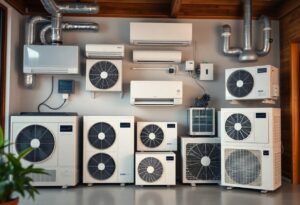Which Heater is Energy Efficient? Expert Picks for Cost-Effective Heating
Staying warm during the cold months while keeping energy costs down can be a challenging balance. Selecting an energy-efficient heater can help you achieve this balance by providing effective warmth without driving up your energy bills. In this blog post, we’ll explore which heater is energy efficient and the expert picks for cost-effective heating, ways to determine if your heater is energy efficient, and why you might opt for an energy-efficient space heater over your home’s furnace. Discover the perfect heating solution for your home today as we provide answers to which heater is energy efficient.
Expert Picks for Energy-Efficient Heaters: Which Heater is Energy-Efficient?
1. Electric Heat Pumps
Overview: Electric heat pumps are known for their high efficiency. They work by transferring heat from the outside air or ground into your home, rather than generating heat through combustion.
Benefits:
- Low operating costs
- It provides both heating and cooling
- Environmentally friendly
Why Choose It: Electric heat pumps can be up to 300% efficient, meaning they produce three times more heat energy than the electrical energy they consume.
2. Natural Gas Furnaces
Overview: Natural gas furnaces are highly efficient and cost-effective, especially in colder climates where a robust heating system is necessary.
Benefits:
- Quick and consistent heating
- Lower operating costs compared to electric furnaces
- Reliable during power outages
Why Choose It: High-efficiency models, known as condensing furnaces, can achieve efficiency ratings of up to 98%, making them an excellent choice for energy savings.
3. Ductless Mini-Split Systems
Overview: These systems provide zoned heating and cooling, which means you can control the temperature in individual rooms separately.
Benefits:
- High efficiency and flexibility
- No ductwork is required, reducing energy loss
- Ideal for homes without existing ductwork
Why Choose It: Ductless mini-splits can achieve efficiencies of up to 30% higher than traditional HVAC systems, especially when used to heat specific areas rather than the whole house.
4. Radiant Floor Heating
Overview: Radiant floor heating systems use either electric heating coils or water-heated tubing installed under the floor to distribute heat evenly.
Benefits:
- Uniform and consistent heating
- Energy-efficient operation
- Enhances comfort without circulating dust
Why Choose It: Radiant floor heating can be up to 25% more efficient than traditional forced-air systems due to the elimination of duct losses and the lower operating temperatures required.
5. High-Efficiency Electric Space Heaters
Overview: These portable heaters are designed for supplemental heating in small spaces, offering targeted warmth where it is needed most.
Benefits:
- Portable and versatile
- Energy-efficient operation
- Ideal for quick and localized heating
Why Choose It: High-efficiency space heaters use advanced technologies, such as ceramic heating elements or infrared technology, to provide efficient and rapid heating.
CCBLicense Oregon CCB Continuing Education 100% Online
We are the premier Oregon CCB continuing education provider for Oregon contractors. Our online courses are approved by the Oregon Contractors Board to provide Residential and Commercial contractors with the CE you need. We offer CE from 1 to 32 hours. Take 10% off any course.
CCBLicense Oregon CCB Continuing Education 100% Online
How to Determine If Your Heater Is Energy-Efficient: Which Heater is Energy Efficient?:
1. Check the Energy Rating
Look for heaters with high Energy Star ratings or similar certifications. These ratings indicate that the heater meets strict energy efficiency guidelines set by the EPA or other regulatory bodies.
2. Evaluate the Efficiency Ratio
For heat pumps and furnaces, check the Seasonal Energy Efficiency Ratio (SEER) and the Annual Fuel Utilization Efficiency (AFUE) ratings. Higher numbers indicate better efficiency.
3. Inspect for Modern Technology
Modern heaters with advanced technology, such as variable-speed motors, smart thermostats, and programmable settings, are generally more energy-efficient.
4. Consider the Age and Maintenance
Older heaters tend to be less efficient. Regular maintenance, including cleaning filters and servicing components, can help improve the efficiency of your existing heater.
Tip of the Day Option 1 Indoor Use
Stay warm and cozy with the best indoor heaters! Discover efficient, safe, and stylish options to keep your home comfortable all winter.
👉 Shop now and find the perfect heater for your indoor space. Experience superior warmth and comfort today!
Tip of the Day Option 2 Office Use
Keep your office warm and comfortable with top-rated indoor heaters! Discover efficient and quiet heating solutions perfect for your workspace.
👉 Shop now and enhance your office environment with the best indoor heaters. Stay productive and cozy all winter long!
Why Use an Energy-Efficient Space Heater vs. Your Home’s Furnace? Which Heater is Energy Efficient?
1. Localized Heating
Energy-efficient space heaters are ideal for heating specific areas where you spend the most time. This can be more cost-effective than heating the entire house with a central furnace.
2. Lower Energy Consumption
Using a space heater in a single room uses significantly less energy than running a whole-house furnace, especially in mild winter climates or during transitional seasons.
3. Flexibility and Portability
Space heaters offer the flexibility to move them between rooms, providing heat exactly where and when you need it without wasting energy on unoccupied spaces.
4. Supplemental Heating
They can supplement your central heating system, allowing you to lower the thermostat on your furnace and reduce overall energy consumption.
Find and Post Jobs on the HvacJobsCenter
Conclusion: Which Heater is Energy Efficient?
Selecting an energy-efficient heater is crucial for staying warm and keeping energy costs down. From electric heat pumps and natural gas furnaces to ductless mini-split systems, radiant floor heating, and high-efficiency space heaters, there are numerous options to meet your needs. By understanding how to determine heater efficiency and knowing when to use a space heater versus your home’s furnace, you can make informed decisions about which heater is energy efficient enhance comfort, and save money.
Find the perfect energy-efficient heating solution (which heater is energy efficient) for your home today, and enjoy the benefits of cost-effective, reliable warmth all winter long.
Follow Us on Google Chrome
- To get started, switch to Google Chrome Browser
- Already on our site
- Top right, tap the 3 dots
- Bottom right, tap follow
- You are done.
Learn more and join our mailing updates.
This post has been written by Team HVAC Talk Magazine. Stay informed and connected with the latest in HVAC—join us for expert advice, troubleshooting tips, and news updates. Don’t miss out, follow us now! #HVACExperts #HVACTips #StayInformed #HVACProTalk








